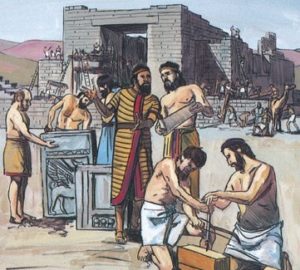
The theme of 1 Chronicles is THE BUILDING OF THE TEMPLE. The central personality is KING DAVID. The Book of 2 Chronicles ends with the Persian King Cyrus’ decree to rebuild Jerusalem, which is where the Book of Ezra starts. The Book of Chronicles therefore links the story of the past temple to the vision for the restored temple during the period of Ezra and Nehemiah. Most importantly it points the reader even further to a GREATER DAVID and a GREATER TEMPLE.
The Book therefore reminds the covenant people of Israel that God made a promise to bring about an everlasting kingdom with a ‘son of David’ on the throne. We read of David’s determination to provide for the building of the temple although he was told that he himself would not build it. 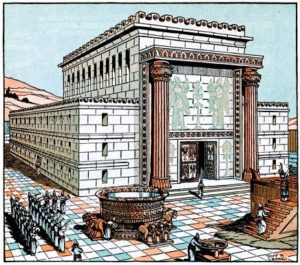
The Book focuses on the southern kingdom of Judah rather than the 10 tribes of Israel to the north. It brings God’s purpose back into view. After reading the history of human failure in I and II Kings, we are reminded that God is still at work and will one day bring about the kingdom prophesied in the Davidic covenant.
After their 70 years of captivity in Babylon, it was time to return to The Story, the Land and the ongoing kingdom vision. The Book of Chronicles brings us back to the future!
In 1 Chronicles 11, the writer distinguishes the reign of King David from that of his predecessor, Saul. Then we have a picture, be it ever so brief, of kingdom unity. “All Israel came together to David at Hebron” (1 Chronicles 11:1a). The people clearly identified with their King. They were more than subjects. They considered themselves as intimate family members. “Behold we are your bone and flesh” (11:1b). The oneness of Christ’s kingdom will be the oneness of Christ and His church- the oneness of a husband with his bride, bone of His bone and flesh of His flesh (Genesis 2:23).
Ephesians 5:30-32 30 because we are members of His body. 31 FOR THIS REASON A MAN SHALL LEAVE HIS FATHER AND MOTHER AND SHALL BE JOINED TO HIS WIFE, AND THE TWO SHALL BECOME ONE FLESH. 32 This mystery is great; but I am speaking with reference to Christ and the church.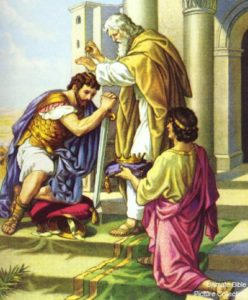
In this chapter we have a prophetic picture that in Christ’s kingdom there will be this kind of unity.
Notice the kind of loyalty described in this kingdom. The subjects affirm that their king proved his worthiness. He was an exemplary military leader, shepherd, and ruler, even when his leadership was not fully recognized during the time of Saul (11:2).
This is a foreshadowing of the worthy rule of Christ. Although He is not yet fully recognized by all as such, the Lord Jesus has already proved Himself to be the worthy king, fit to lead us into victory, deliver us from oppressors, and rule as King in His kingdom.
David is made King at ‘Hebron’, literally meaning ‘the seat of association or fellowship’.
To experience the kingdom rule of God we must first be reconciled to Him and have fellowship with Him. How? We must come on the ground of fellowship established through the cross. Have you recognized Who Jesus is, as the Son of God, the King of Kings? Have you trusted the merits of His atoning death provided on the cross on your behalf to remove the barrier of your sin? Sin separates us from God. The work of the cross provides the means for our reconciliation. The sin barrier, or sin-debt incurred by our disobedience to God’s law, prevents fellowship with God. It must be removed through the perfect sin offering, the poured out life of the atoning Lamb of God. You must transfer your trust from your sinful ways, placing it in Jesus Christ, the Lord our Righteousness Who knew no sin. You must trust What He has done on your behalf when He, as Your Substitute, took the punishment Your sin deserved when He suffered death on the cross. If you are willing to trust Him as Lord and Savior, submitting to His rule over your life as your rightful King, you can enjoy ‘Hebron’- fellowship with Him. ‘The seat of association of fellowship with Christ the King’ is personal recognition and trust in Who Christ is, and what He accomplished on your behalf in His saving work on the cross.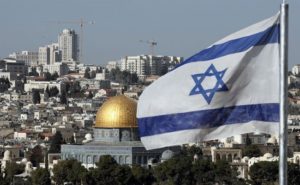
After ‘Hebron’, David and all the Israelites march to Jebus (Jerusalem). The city’s occupants, the Jebusites, refuse to surrender the city at first. David challenges his men to occupy Jerusalem, the city of peace, saying, “whoever will lead the attack will become commander in chief”. Joab, David’s nephew, leads the battle and consequently becomes commander in chief.
Jerusalem is the city of peace. It is to be the capital city for The Prince of Peace. Today it is still called “The City of David” (together with David’s birthplace, Bethlehem). It is a testimony to God’s faithfulness to see ‘the flag of David’ flying in Jerusalem today.
Next, we read about David’s mighty men who gave David’s kingship strong support.
How does your life give strong support for the rule of the Greater David, Jesus Christ?
The men are listed together with their significant accomplishments. These loyal and brave followers of the king are designated in groups. The text divides them into “The Three” and a general group titled “The Thirty” (of which it appears there were more than 30; 37 are listed.)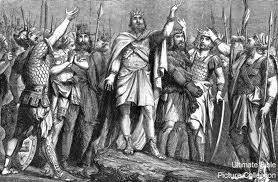
There are 16 more names in 1 Chronicles 11:10-47 than in the account of the mighty men found in 2 Samuel 23:8-38. (You may notice that the third mighty man listed in 2 Samuel 23:9-11 is not mentioned here.)
The Three were noted for their sacrificial service. They put David’s interests ahead of their own. David expressed His longing for water from the well near the gate of Bethlehem, his birthplace which at this time was occupied by the Philistine army. These three men broke through the Philistine’s line of defense, heroically drew water from the well, and returned with it to David. David was more refreshed by their demonstration of selfless love. These mighty men reflected the sacrificial love of the Triune God. They were willing to sacrifice their lives to meet the need of their King.
Their selfless concern and sacrificial deed are part of the written record of Chronicles. David responded to their heroic act, by seeing the love of God in it. The three mighty men imaged God to David. He responded with an act of worship. He refused to drink it and poured it out before the Lord as a drink offering (1 Chronicles 11:16-19).
“Such were the exploits of the three mighty men” – a picture of sacrificial service motivated by a love for their King!
Do we image the love of God to others when we give a cup of cold water in Jesus name?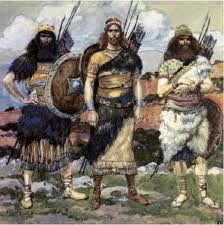
How willing are we to give the Lord what He is longing for? Are we tuned into the concerns of The Greater David?
The names of the chief three mighty men are: Jashobeam (Ishbosheth), Eleazar, and Shammah (according to 2 Samuel 23:8-12). But we don’t know for sure the names of the three that risked their lives to fetch David water from the well of Bethlehem.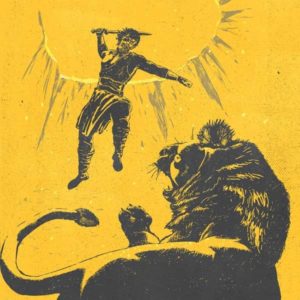
Abishai, the brother of Joab, was doubly honored above the Three, and became their commander, even though he was not numbered with the three.
There are other notable warriors whose significant accomplishments are recorded: Benaniah, who in addition to striking down two choice Moabite warriors, “went down into a pit on a snowy day and killed a lion” (1 Chronicles 11:22). He struck down a 7-and-a-half-foot tall Egyptian who had a spear like a weaver’s rod in his hand. And Benaniah did this with a simple club. He was not included in The Three, but was made the head of David’s bodyguard, for good reason!
Notice how people are listed in respect to their relationship with King David. We are listed in the Book of Life on the basis of our relationship with the Greater David, Jesus Christ. Is your relationship with Him a real and a saving one?
There is a list of those who followed David when he was at Ziklag, when he was not yet enthroned as King. These are his followers when he was an outcast, despised and rejected by King Saul. This was before he was popular and universally accepted as king. To be identified with David meant persecution from the reign of Saul. This is a picture of our identification with Christ in this present age, before He is recognized by all at His return as the One True King of Kings and Lord of Lords.
The Spirit coming upon Amasai is a foreshadowing of the Holy Spirit coming upon a believer. The effect of the Holy Spirit’s ministry in the life of the believer is one of actualizing full identification and union with Christ, His person, His purposes, and His people (1 Chronicles 12:18).
Lord- We are yours! (He purchased us!)
Lord- We are with you! (God is faithful who has called us into the fellowship of His Son! 1 Cor 1:9)
Lord- we seek first Your kingdom!- (Matthew 6:33). We desire that Your interests, Your agenda, and that Your purposes prosper. The Holy Spirit enables us to accomplish ministry in Jesus’ Name. “Success, success, to You, and to all those Who help You!”
Is that your chief heart-cry today? If not, ask the Lord to fill You with the Holy Spirit.
NEW TESTAMENT READING: Acts 28:1-31
We finish the Book of Acts today, but the Acts of the Holy Spirit in the Church continues.
Acts 28 is the culmination of the journey of the gospel throughout the Roman Empire, as testimony is brought before centurions like Lysias, procurators and governors like Felix and Festus, Kings like Agrippa. Now Paul is ready to testify of Christ to Caesar and his royal household.
The account started in 30 AD just after the resurrection of Jesus Christ. The opening scene is in a remote province of the Empire- outside Jerusalem in Judea in Palestine. By the end of the Book of Acts, in 62-63 AD- Christianity has spread through the known world in one generation.
We are given 4 accounts of the life and ministry of Jesus in the 4 gospels, but only one narrative of the early church. It is only by the Book of the Acts that we are given a picture of how the New Testament church was formed by the Holy Spirit through the preached Word at Pentecost. It is only by the Book of Acts that we are able to see how the Lord added to the church those who were being saved- in Jerusalem, Judea, Samaria and to the utter parts of the earth.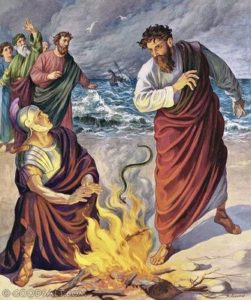
We pick up the story on the island of Malta where the 276 survivors of the shipwreck were taken care of for a three month stay.
God’s favor is shown in the way that Paul is protected from any ill effect after being bitten by a poisonous snake. Such supernatural occurrences, such as picking up serpents, being delivered from the deadly effects of poison, and physical healings, although never guaranteed as normative in the Christian life, are described and predicted in Mark 16:18 as being part of the ongoing work of Christ in His church.
Paul prays for the sick people on the island, including the father of the chief man there, Publius, and their health is recovered.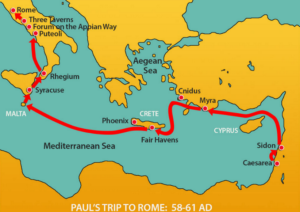
The Book of Acts concludes with Paul arriving in Rome where he gathers the Jewish leaders and testifies of Jesus’ role as the fulfillment of the Law and the Prophets. Jesus is the prophesied Son of David, the appointed and anointed King in the kingdom of God. Paul testifies of God’s saving grace through Jesus.
Paul warns the Jewish leaders that they do not have a monopoly on God’s offer of salvation, and that although salvation is of the Jews, it is being offered to the Gentiles. And unlike many of the Jewish leaders, the Gentiles will listen (Acts 28:28).
The chapter’s ending seems abrupt. Paul is awaiting trial. He has written this account possibly to prepare his defense attorney (Theophilus?) for his appeal to Caesar. The Book ends where it should end and does end, under the careful supervision of the Holy Spirit. We have a series of verbs and two adverbs.
We see Paul welcoming– proclaiming (preaching) and teaching– He is doing this boldly-(Greek word is ‘parhessia’) openly, confidently, freely, not secretly, not apologetically, and without hindrance. The last word in the Greek New Testament Book of Acts is ‘unhinderedly’. We pray that this is the way we will function as fruit-bearing disciples- unhinderedly in the work.
The progress of the gospel does not stop with Chapter 28. It continues with us. And may it not stop with us, but may we be fully involved in the ministry of Christ in His Church as He makes us an army of disciple-making missionaries. May we pass the torch to the future generation of disciples.
READING FROM THE BOOK OF PSALMS: PSALM 9:1-12
This Psalm joyously recounts and anticipates the Lord’s reigning as King and Lord over all. Notice the repetition of the phrase: The Lord sits enthroned! He reigns in righteousness and His justice will prevail!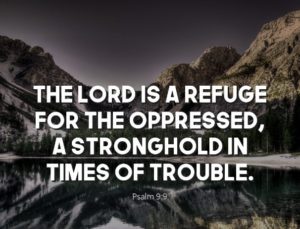
Our confidence is in God’s mercy as well as His justice. Our confidence is in the finished work of righteousness on the cross where Christ turned the judgment seat, into a mercy seat, for those who believe. In Christ, our cry “Be gracious to me!” is answered (Psalm 9:13)
Psalm 9:10 10 And those who know Your name will put their trust in You, For You, O LORD, have not forsaken those who seek You.
David is a whole-hearted worshiper. Let us share his resolve!
Psalm 9:1-2 1 I will give thanks to the LORD with all my heart; I will tell of all Your wonders. 2 I will be glad and exult in You; I will sing praise to Your name, O Most High.
Does this describe your life? You have plenty to thank Him for. Do it with all you heart.
Verses 3-6 encourage us to take the long view. The Lord is in control. He sits on the throne and will judge with righteous judgment.
Let us recount His wonderful deeds!
READING FROM THE BOOK OF PROVERBS: PROVERBS 19:1-3
Proverbs 19:1-3 1 Better is a poor man who walks in his integrity Than he who is perverse in speech and is a fool. 2 Also it is not good for a person to be without knowledge, and he who hurries his footsteps errs. 3 The foolishness of man ruins his way, And his heart rages against the LORD.
PRAY FOR THE NATIONS
(Don’t forget to download the Operation World Prayer App) Let’s exercise our priestly duties and pray for the nations. Today we continue to pray for Indonesia. (Prayer Guide pages 446-463)
http://www.operationworld.org/prayer-app/
PRAYER: Gracious God, like King David, we are encouraged to worship You with ALL of our hearts! When we think of all the great things You have done and the wondrous provision of Your gracious gift of salvation, our hearts well up with praise and thanksgiving. Your kingdom is an everlasting kingdom. Help us to discern Your kingly rule and take the long view, keeping Your eternal purposes in mind. Like the mighty men who served King David, we want to give ourselves in utter abandon to You, in service of the greater Son of David, the Worthy Lamb of God who reigns on the Throne. Thank You for the gift of the Holy Spirit who makes real our faith-union with Christ so that we can say- We are Yours! We are with You and You are with us! We seek to serve Your kingdom purposes today UNHINDEREDLY! Thy will be done on earth as it is in heaven, in Jesus’ Name. Amen.
Pastor David
